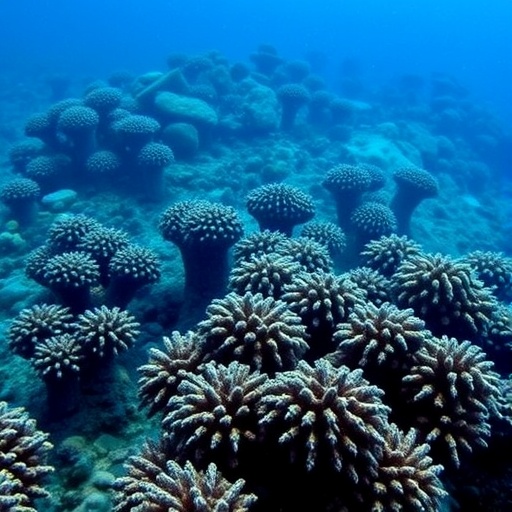Recent advancements in marine biology have shed light on the delicate interplay between marine organisms and their environment. A groundbreaking study focusing on the metabolic responses of shallow-water black corals has emerged, highlighting the resilience and adaptability of these unique organisms when faced with extreme particle concentrations. Black corals, members of the order Antipatharia, are not just remarkable for their ecological roles; they are also witnesses to the ongoing changes in oceanic environments due to anthropogenic influences. Through meticulous research, scientists have uncovered critical insights into how these corals manage stress during short-term exposure to elevated particle concentrations.
Historically, black corals have been viewed largely as enigmatic creatures due to their slow growth rates and deep-sea habitats. However, recent shifts in environmental conditions have brought them into the limelight, revealing their vulnerabilities and adaptive mechanisms in response to rapid changes. The current study focuses on the immediate metabolic reactions of these corals when subjected to increased levels of suspended particles, which mimic the conditions seen during events like sediment run-off, storms, or human activities like coastal construction.
The researchers devised a series of experiments designed to simulate extreme particle concentrations, carefully measuring the corals’ metabolic responses. They found that despite the stress induced by the particles, these resilient organisms demonstrated remarkable adaptability. This adaptability was particularly fascinating given the unique physiology of black corals, which allows them to utilize various strategies to maintain their metabolic functions in less-than-ideal conditions.
In examining the metabolic response, the scientists analyzed several factors, including respiration rates, energy expenditure, and overall physiological health. They discovered that while the corals exhibited an initial spike in metabolic stress, their adaptive mechanisms kicked in rather rapidly. This ability to switch energetic pathways is crucial, as black corals typically rely on their symbiotic relationships with photosynthetic organisms within their tissues to sustain their energy needs. As particle concentrations rose, the corals adapted by altering their dependence on light-driven photosynthesis, emphasizing their resilience in fluctuating environments.
Moreover, the study illuminated the intricate ways black corals interact with their environment. The presence of increased particles not only impacts their physiological condition but also influences their behavioral patterns. For instance, changes in feeding behavior were observed, which showcased the corals’ need to adjust their energy intake in response to environmental shifts. This dynamic feeding behavior underscores the vital link between corals and the marine ecosystems they inhabit.
Significantly, the findings raise concerns about the long-term consequences of rising particle concentrations in marine habitats, particularly in light of ongoing climate change and coastal development. The study suggests that while black corals possess inherent resilience, prolonged exposure to suboptimal conditions could compromise their survival and impair their ecological functions. This realization prompts a larger conversation about conservation efforts and the necessity of protecting these ancient organisms from further environmental degradation.
Pedigreed by their evolutionary history, black corals have persisted through climatic shifts and environmental changes over millions of years. However, the rapid pace of today’s environmental changes poses extraordinary challenges to their survival. The scientific community must not only quantify the direct impacts of stressors like increased particle concentrations but also understand their interconnectedness within broader ecological networks.
The implications of this research extend beyond black corals themselves. Ecosystems relying on these corals for structure and habitat could face significant disruptions if these organisms are unable to cope with increasing environmental challenges. Reassessing the health of marine ecosystems through the lens of black corals provides a critical framework for understanding the resilience of other marine species and habitats.
In terms of future research, the study underscores the importance of longitudinal investigations that track metabolic changes in black corals over time. Understanding the cumulative effects of various stressors will be integral in developing effective conservation strategies. Scientists advocate for a multidisciplinary approach, incorporating genetic, physiological, and ecological studies, to unravel the complexities of coral responses to environmental stress.
Additionally, the researchers emphasize the need for public engagement and awareness regarding the plight of corals. By fostering a deeper understanding of these ecosystems’ fragility, we can encourage more people to advocate for sustainable practices that protect our oceans. Education and community involvement are crucial as they can lead to better stewardship of marine environments.
Ultimately, as the oceans face unprecedented changes, studies like this highlight the urgency of scientific inquiry and global action. The unique metabolic responses of black corals not only enrich our understanding of marine biology but also serve as a crucial warning about the health of our planet’s marine ecosystems. As we move forward, the preservation of these ancient corals will likely hinge on our collective ability to mitigate environmental impacts, ensuring that these resilient organisms continue to thrive in a changing world.
In conclusion, the metabolic responses of black corals in the face of extreme particle concentrations reveal a complex tapestry of life, adaptation, and ecological interplay. Their ability to withstand short-term stress raises critical questions about long-standing environmental practices and their sustainability. As we look to the future, it is essential to maintain a close watch on these unique organisms, ensuring their protection and understanding in the face of ongoing environmental change. The importance of such research cannot be overstated; it is a clarion call for collective action to safeguard not only the black corals but the entire tapestry of life that our oceans support.
Subject of Research: Metabolic response of shallow-water black corals (Antipatharia)
Article Title: Metabolic response of shallow-water black corals (Antipatharia) facing extreme particle concentrations during short-term exposure.
Article References:
Dimopoulos, A., Dubois, P., Todinanahary, G.G.B. et al. Metabolic response of shallow-water black corals (Antipatharia) facing extreme particle concentrations during short-term exposure.
Coral Reefs (2025). https://doi.org/10.1007/s00338-025-02714-w
Image Credits: AI Generated
DOI: 10.1007/s00338-025-02714-w
Keywords: black corals, Antipatharia, metabolic response, particle concentrations, marine ecosystems, climate change, conservation strategies, ecological networks.




